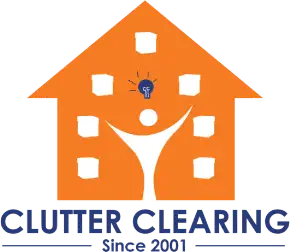A Banbury Based Businesswoman is providing Social Gatherings for more than 6 from her shed at the end of her garden to Support Clutterholics and Hoarders during the pandemic, online.
As it seems more likely that we will experience increasing restrictions to our daily lives over the coming months, one Banbury Based Businesswoman has been supporting a much-forgotten group of people who have suffered in silence since the current crisis began – Clutterholics and Hoarders.
At the beginning of Lockdown back in March lots of people put their enforced time at home to good use by having a clear-out of clutter. For the people Clare’s helps, a clear-out was never going to make a difference. The people she helps have at least 3 rooms in their home that they can’t use or be comfortable in because of the clutter, and they’ve had those 3 rooms like that for at least 3 years.
Throughout the pandemic Clare Baker, who is herself a former clutterholic and borderline hoarder, has been supporting clutterholics and Hoarders around the world virtually from her shed at the end of her garden.
As Clare explains, ‘The people I help need more than just a clear-out or tidy-up. They have habits that cause them to accumulate clutter without them even realising it, so a Lockdown clear-out was never going to work and make a meaningful or lasting difference.’
‘The people I help have told themselves for years that they just need time to go through their clutter and that once they’ve cleared the backlog they’ll be able to keep their homes clutter free. Although lockdown provided some focused time without the normal distractions, it also meant a lot of people realised that it wasn’t just an issue of time and they didn’t have ‘just a little bit of clutter’.’
Many people that Clare has been helping realised as a result of being in their homes 24/7 that they had a LOT more clutter than they thought, that it was going to take more than a few weeks to clear, that they didn’t know where or how to start, and that they didn’t know how to make decisions. Added to that, charity shops and other outlets were closed so there was nowhere to be able to pass on unwanted clutter to.
Of course all these realisations made them feel mentally overwhelmed, hopeless, helpless, anxious and out of control, so many started searching for help and advice online. That’s when they found Clare and her unique virtual help.
Consequently Clare, who works alone in her shed at the end of her garden, saw an instant increase in demand from people around the world.
‘I’ve been helping people in the UK, Europe, Canada, America, New Zealand and even Japan since the pandemic began. I know first-hand that living with and struggling to deal with a clutter challenge can lead to mental health issues, and unfortunately the pandemic has merely increased the challenges that clutterholics and hoarders face to maintain their day-to-day mental health as they are forced to live with their clutter 24/7.
What’s more, there are just as many clutterholics and hoarders who were in denial about the extent of their clutter until the pandemic which has forced them to finally face the reality of their extreme clutter – which has also lead to anxiety and depression in those people who didn’t previously suffer.’
So at the beginning of March, because Clare knew people were starting to struggle with their clutter as lockdowns around the world started to come into force, she introduced a new online support group called the Social Gatherings for anyone who wants and needs to know they’re not alone while living with extreme clutter during this pandemic.
‘They’re the only Social Gatherings where we’re not limited to 6 people!’ says Clare. ‘We’ve got people who join from all over the world because there are people everywhere who are being forced to live with extreme amounts of clutter during the pandemic. In the UK alone it’s estimated there are 1.2 million hoarders – 1.2 million people who are living in homes that aren’t safe, where they can’t easily sit on their sofa, sleep in their bed, wash their clothes or are having to go out every day to buy food because they have nowhere to store it.’
The response to her new Social Gatherings has been hugely positive. People have been telling her what a relief it is to find a ‘safe space’ to talk in real time and face-to-face about what it’s like to be living with clutter during the pandemic and what a comfort it is to be able to connect and talk to others with the same challenges without having to justify or explain themselves. They take comfort from the fact they can share experiences with people who understand, people who don’t judge them, who know what it’s like to be living with clutter right now, and who are there just to listen and support them unconditionally during this difficult time.
‘Most people think that you can only help clutterholics and hoarders by going into their home and encouraging them to get rid of their stuff quickly’ says Clare. ‘That’s not true, and that type of ‘help’ doesn’t work long term. I’ve been successfully helping clutterholics and hoarders around the world become clutter free forever for the last 20 years, without stepping a foot inside their homes and instead from my shed at the end of my garden.’
According to Clare, most clutterholics and hoarders don’t need someone to come to their home to help them declutter.
‘The popular and common advice is that if something is useful, you love it, or it brings you joy then you should keep it.
That isn’t helpful for my clients who have had their clutter challenge for at least 3 years. My clients use that ‘advice’ to justify keeping everything because they believe everything ‘will come in useful’, lots of things from their past are sentimental to them, and they form emotional attachments to things in their clutter that represent unfinished projects and unfulfilled hopes and dreams.’
‘I help clutterholics and hoarders figure out what the right decision is for THEM by sharing the knowledge, tools and skills they need to work out what’s right for THEM – the same knowledge, tools and skills I had to develop when I cleared my own extreme clutter 20 years ago. As I always say, what to me may be a worthless scrap of paper may be to someone else a last note from a loved one. It’s not my place to make judgments about what’s meaningful to you and to pressurise you to get rid of it. What you need is help to learn how to make your own decisions and get back control yourself – and I don’t need to be in your home to teach you how to do that.’
Clare says she will continue to support extreme clutterholics and hoarders from her shed at the end of her garden regardless of changing restrictions on daily life, by continuing to provide a safe space and positive focus for people who want to use this uncertain productively to get the support they need or who want to start dealing with their clutter challenge with the online Social Gatherings that anyone anywhere in the world can join, just as she has over the last 6 months.
‘I’ve already got some exciting new things planned over the next 6 months to make it even easier for people to succeed with clearing their clutter so that they – like me – can know what it’s like to change your live and become completely clutter free so they never have to worry about their clutter growing back ever again.
I’m determined that more and more people will be able to look back on 2020 and say ‘that was the year I finally started to successfully clear my clutter and became clutter free’.
Clare’s 7 top tips for anyone who has realised that their clutter won’t be cleared with just a clear out and has had it for 3 years or more are:
- Know you’re perfectly normal and not alone. There are an estimate 1.2 million hoarders in the UK – and many more people who – like I was – borderline hoarders.
- Know that the TV programmes don’t help people long term for most people featured on them. I’ve had enough clients over the last 20 years who have been on those TV programmes and – much like a diet – found that the clutter has grown back and is often worse than before – to know that the TV programmes are no more than a big blitz which doesn’t last.
- Know that friends and family may try to help, but unless they’ve lived with a clutter challenge themselves they will never truly understand the challenges you face. You can get the help and understanding you need to succeed by meeting other people who DO know what challenges you face and are also struggling with clutter during the pandemic, virtually.
- Know that clearing your clutter is a LEARNED behaviour, not one you’re born with. There are many ‘ingredients’ from our past that cause us to struggle with our clutter and every clutterholics combination of ‘ingredients’ is unique to them. I help people discover what ‘ingredients’ caused their Clutter Challenge, give them ‘new ingredients’ so they can choose to change their future to get a different result – hopefully a happier and sweeter one!
- There is no pressure for you to deal with your clutter during the pandemic. Just because everyone and their mother seemed to take up learning a new skill at the beginning of the pandemic doesn’t mean you have to learn how to clear your clutter (!) If you just need mental and emotional support so you can accept and live with your clutter and get yourself through the pandemic without trying to clear your clutter, that’s fine.
- Consider spending some of your time during the pandemic understanding WHY you have your clutter challenge. It may be a welcome distraction and focus from the chaos that’s going on outside our front door. We can’t change the pandemic – we can use this time to start understanding our clutter challenge.
- Remember that clearing your clutter is NOT about creating a show home. Clutter Clearing is about creating a home that works for YOU, represents YOU and is comfortable for YOU whilst also being a safe space for YOU to be in where you can comfortably and safely use every room in your home.

